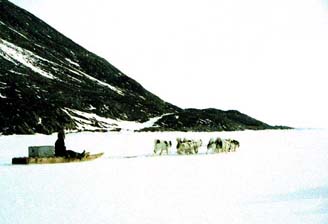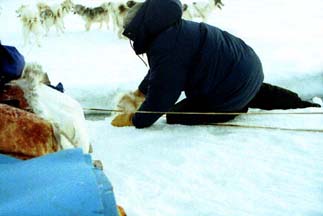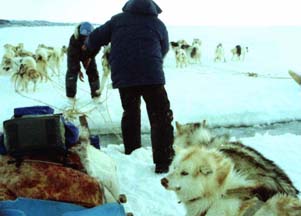Table of Contents
*
We Are Not Alone
*
Research Paper II: Occupational Osteoarthritis
*
Who is an ISDI "Member"
*
Northern Inuits (sic), Again!
*
High Arctic Mushing: Part IV
*
The Inuit Dog: Its Provenance, Environment and History
*
Preserving "Bear" Dogs
*
Janice Howls: Extinction
*
IMHO: Little Minds, Little Worlds
*
Index of The Fan Hitch, Volume IV
Navigating This
Site
Index of articles by subject
Index
of back issues by volume number
Search The
Fan Hitch
Articles
to download and print
Ordering
Ken MacRury's Thesis
Our
comprehensive list of resources
Talk
to The Fan
Hitch
The Fan Hitch
home page
ISDI
home page
Editor: Sue Hamilton
Webmaster: Mark Hamilton
Contents of The Fan Hitch Website and its publications are protected by international copyright laws. No photo, drawing or text may be reproduced in any form without written consent. Webmasters please note: written consent is necessary before linking this site to yours! Please forward requests to Sue Hamilton, 55 Town Line Rd., Harwinton, Connecticut 06791, USA or mail@thefanhitch.org

Peter Aglak and his team Hamilton photo
Mushing in the High Arctic: Part IV
by Sue and Mark Hamilton
It was just a week ago that we did our final packing in Connecticut to leave for the Arctic and already, this morning, we were organizing our gear to leave Button Point for the return to Pond Inlet. It hardly seemed fair. We were jealous of Dave whose plan was to spend a full two weeks on the ice. After breakfast, Mark packed while I visited with all the dogs. I had always been reluctant to "over handle" these animals. They were not pets. Demonstrations of affection on my part were not likely to be the norm for them and I was afraid they would grow to "miss" the caressing and ear scratching. But I just couldn't help it. Once eye contact had been made, dog and human were drawn to each other. I offered every animal equal contact time, carefully stepping around the leftovers of last night's meal: a flipper here, a skull there, a hunk of skin and fat laying ignored. I respected the distance between me the shy dogs. The tentative but curious dogs I approached in a crouched posture and enticed them to come close. Those who did melted in my hands.
The time finally came to say our good-byes. We thanked Dave for his good company and humor, and wished Jayko good luck with his dogs, thanking him for sharing his lifestyle with us. And with that, we assumed our positions on Panueli's qamutiq. He clicked softly to his team and we were off. It wasn't long before the steep mountainsides of Bylot Island on our right and Baffin Island on our left obstructed our broad view of Baffin Bay. Had we been claustrophobics, it would have been time to feel as if the walls, nearly ten miles apart, were closing in.
On first impression, the North appears a pristine wilderness. But it is well documented that pollution exists above that dotted line we call the Arctic Circle. During the course of this adventure, we too were subject to pollutants. With the dogs on the move, there was always a head wind and, to avoid inhaling clouds of burning tobacco, we zipped up our hoods into a snorkel position and turned around. Cigarettes, however, were not the only source of fumes to which we were subjected. Not being fed but every other day, the dogs work up a monstrous appetite. Thus, it was not unusual for them to pass stools looking like used motor oil accompanied by vile smelling gas.
Panueli wasn't much for conversation. We knew he didn't speak a lot of English and perhaps he was shy. He spoke more to his team in the form of commands and those were generally infrequent. So Mark and I spent the hours watching the dogs work, watching the scenery, periodically switching seating arrangements, playing mind games (How long is it going to take to reach landmark X (always far longer than we guessed), contemplating the meaning of life, the universe and everything. We napped too, slumped over against the wooden utility box or even while sitting on top of it, an acquired skill.
We had been driving nonstop for several hours when our frozen highway became cluttered with chunks of ice, having erupted sometime after our outward passage, from recent pressures of wind and tide. The amorphous blocks ranged up to two feet high and presented as a maze with no apparent clear path through or around. Panueli briefly paused the team and stood atop the helm of his "ship" surveying the icescape before settling back down and giving his dogs the command to proceed. By voice alone he guided them with great finesse around, up and over, occasionally hopping off the qamutiq to shove the front end to one side of an obstacle. We held on white-knuckle tight as the sled pitched and lurched. And when it was over, having reached the far side of this wreckage of ice, we pulled off our mitts and applauded loudly. Panueli turned around with a surprised and puzzled look of, "Hey, no big deal."
Panueli kept us on the move for six-and-one-half hours without a break. This was the longest continuous stretch of running we had done during the entire trip and I wasn't sure if our guide intended to get us back to town non-stop. The dogs marched along as if they could go on forever. Even the gray male who was visibly lame kept the pace, with little encouragement from voice or whip. When Panueli finally did bring the team to a halt, the dogs needed no convincing to lay down, yet they appeared hardly winded. Without delay, our guide set up the primus and put on one pot for tea and another for our dinner. The canned Swedish meatballs accompanied by the ubiquitous chunk of bannock was a welcome and tasty warm meal. We rested for about forty-five minutes, cleaned up from supper, while Panueli untangled the tug lines and chatted a bit. All gear and bodies stowed back in their places, we quietly journeyed on.
We had been traveling for no more than thirty minutes when we met a team approaching from the direction of town. Both drivers brought their hitches to a halt after a totally uneventful head-on close pass. The two drivers conversed in Inuktitut while we stood around admiring the eight dog fan and contemplated the purpose of this solitary traveler's journey towards open sea. Panueli returned to his team and to our surprise, the other driver turned his dogs around and headed back to town with us. Peter Aglak's short, ten-foot qamutiq, was unadorned beyond a small wooden utility box, a piece of plywood from in front of the box to the front of the qamutiq and his dog whip. Mr. Aglak relaxed against the box with his hands hanging at his sides. The uncomplicated image spoke loudly of the independence, self-confidence and success with which polar people have occupied this land for thousands of years.
During the course of our return to Pond, I managed to occupy most of the time in observation, quiet reflection and napping. Watching Mr. Aglak's team working while he barely moved must have put me in a sort of hypnotic trance. I 'came to' in the middle of chaos. Blinking back into full consciousness, I realized the qamutiq had come to a stop. Many dogs were wandering alongside and behind me, one out of his harness.

Balancing on the edge, Mark fishes a dog
out of the lead
Hamilton photo
There were a few dogs from both teams in front of the sleds at rest at the end of their tug lines and, at least six were foundering in a frigid, black water in between the two sides of a four-foot wide lead! Panueli was on the far side hauling dogs out or attempting to catch the dogs that Mr. Aglak and Mark, on the near side, were fishing out and pitching across. They also had to hurl the dogs 'lucky' enough not to have gone in. Those usually reached the other side in one ungraceful fling. The soaking wet dogs were heavier and some flew in a low arc, slamming into the opposite edge of the lead, only to plunge back into the water. Having experienced by now several crossings where dogs had to be rescued, although none so dramatic as the one unfolding before me, I finally had the presence of mind to sit tight and burn up the film remaining in my camera. I figured that the men were doing okay without my help. Mostly I was scared to death that I would become a 'pedestrian', certainly incapable of leaping to the far side of the lead. With all dogs across, Mark and Mr. Aglak boarded their respective qamutiit and all dogs and humans were finally reunited. We sorted out the tug lines and settled back into place. But, just as Panueli was ready to take off, I realized my hat was missing. On looking back, I spotted it on the other side! Without hesitation, Panueli jumped across the lead and then back, toque in hand. His leaps and two-footed landings wouldn't win any style points at the Olympics, but he earned a perfect "10" on my score card! Once again underway, we began the final leg of our journey. By now even I was eager to lay eyes on the village, which just HAD to be around the next mountain.

A heave, and the sodden dog is in
Panueli's grasp
Hamilton photo
It began with one, then there were two in a row - people out for a ride. The trickle turned into a parade. Signs of nearing the settlement became more and more abundant. It was mid-evening Friday, after supper, the end of the work-week. And just as we southerners like to get out of town for the weekend whenever we can, so do the residents of Pond Inlet. With spring break-up, a time which would make travel very difficult if not impossible, only weeks away, the people of Pond Inlet were eager to take advantage of one of their final opportunities to get to get away from town to camp and hunt at the floe edge. The air became a-buzz with the sound of snow machines towing qamutiit loaded down with families who waved enthusiastically in our direction as we passed each other. Some of these sleds were marvelous examples of northern ingenuity. Huge plywood boxes, fashioned from sea-lift shipping containers were bolted onto the runners, spanning the full width and nearly the entire length, humans and gear all piled in happy disarray. Other qamutiit bore little "yard barns", several with Plexiglas windows, of all shapes and sizes, also made from shipping crates. Several of the bigger snow machines towed tandem qamutiit, the first for family and gear, the second bearing a motorized boat. From the boat beluga, narwhal and walrus could be hunted at the floe edge. Boats were also useful should the leads unexpectedly become too wide to traverse by snow machine and qamutiq, in which case the boat would be unloaded, put into the water and used to transport people, sleds and snow machines to the far side where everything is then repacked. I thought of the difficulties that lay ahead of them at the lead crossing. Some drivers would build ramps of snow and ice on the near side, then gun the engines of their metal steeds in order to sail over. Sometimes, building ramps was ignored and the snow machines were just ridden skipping across the surface of the water before reaching the ice on the far side. With a long lead line, pulling the long qamutiit across would be the easy part.
The cacophony of laughter and two-stroke engines finally died away, and as the sound of the last machine faded behind us, the hamlet came into view. The dog teams picked up the pace. Around 10:00 PM, Panueli brought his team to a stop while Mr. Aglak continued on to the other side of town, disappearing around a point of land jutting out into the inlet. Without ceremony, we unpacked our gear and piled it on the shore. We exchanged good-byes with our guide and then he, too, disappeared around an outcropping of rock on the frozen shoreline. Cold and exhausted, we were wondering if we had the strength to haul all our gear back to the hotel, when a young man approached us from the road high above where we had landed. Greeting us with a broad smile, he helped haul our belongings into the back of a large, old pick-up truck. As we settled inside the warm cabin, he held up a set of keys and jingled them in front of us. "Your hotel room," he grinned, as we pulled away up the hill.

The adventure nearly over, feelings of
both relief and
sadness
as the hamlet comes into view
Hamilton photo
End of series